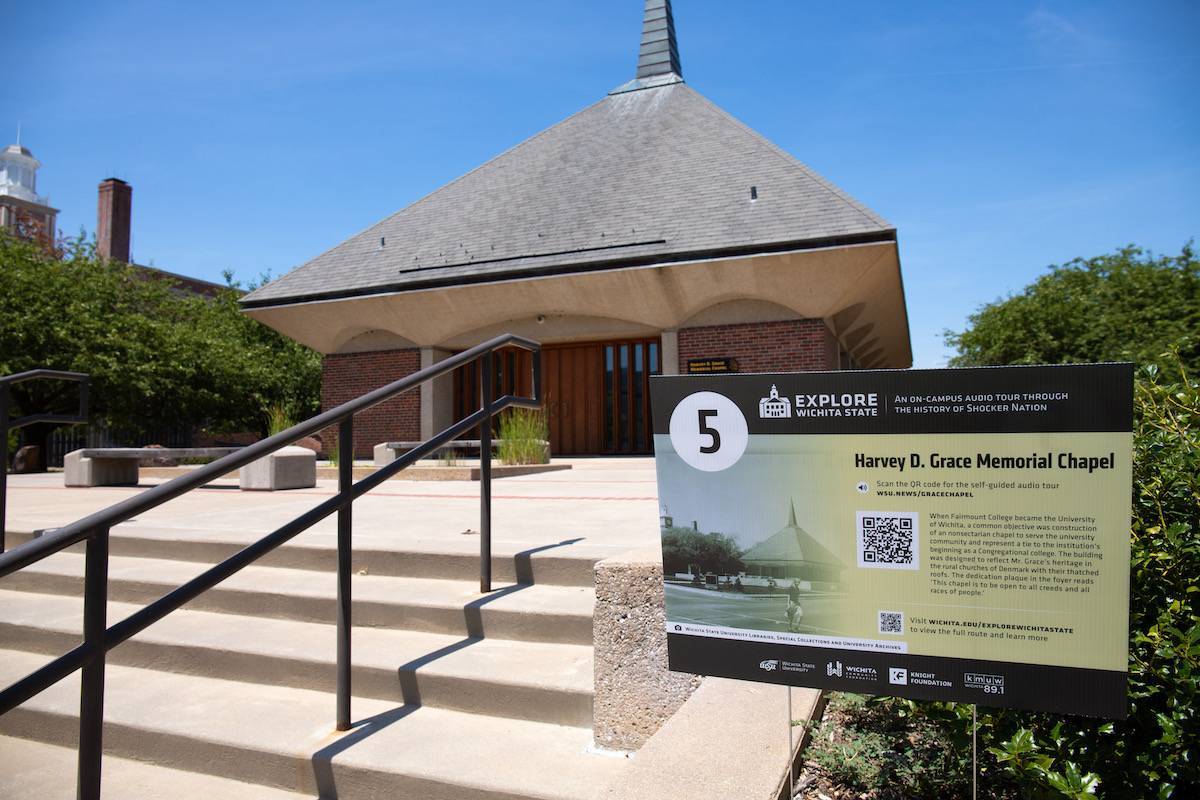Wichita State University’s 330-acre campus is filled with picturesque buildings and construction projects that will carry the university forward. Works of art, tulips and quiet places to study add to the beauty. Throughout campus, the landmarks carry stories of history and significance.
Who is the pioneering woman who saved one of Wichita State’s enduring scenes from bulldozers? Which educational building on campus has its roots in Baghdad, Iraq?
How did a quiet road through campus turn into “Alumni Walk,” a pedestrian corridor highlighted by interactive stops and art? What is the university's prominent role at the 1936 Berlin Olympics?
Campus visitors can learn these Shocker stories and more with “Explore Wichita State,” a self-guided audio tour of campus.
“Explore Wichita State” is directed by the Wichita State University Placemaking Initiative. Host Carla Eckels of KMUW narrates and brings you the voices and stories that illuminate the tour.
“We assembled a large group of people to help determine the tour stops and provide story and background on each stop,” said Kristin Beal, Wichita State placemaking and special projects manager. “This project began in 2020 and has deep connection to the Shocker community through Mary Nelson and Jessica Cerri’s expertise with the Ablah Library Special Collections and Dr. Jay Price and students from The Society of Public Historians.”
The seven-stop tour starts at the Ulrich Museum of Art and ends at the Carnegie Library Columns at 17th and Fairmount. Well-known sites such as the Joan Miro mural and the Corbin Education Center, designed by Frank Lloyd Wright, are discussed.
The landmarks provide the setting to illuminate the university’s signature personalities and scenes.
- Former president Harry Corbin led the decade-long fight to bring the university into the state system in 1963. He resigned as president soon after and returned to teaching. The Corbin Education Center, home of Wichita State’s College of Applied Studies, is named in his honor.
- Fiske Hall is the oldest building on campus and has served many purposes since constructed in 1904. Currently, it’s home to the history and philosophy departments.
- Kathlien Edmiston, a graduate and dedicated supporter of the university, worked to preserve the Carnegie Library Columns from destruction.
- The Student-Athlete Success Center is a fitting stop to focus on Wichita State’s championship legacy in athletics, and its pioneering efforts in diversity.
Visitors hear from people such as Bob Workman, former director of the Ulrich Museum of Art; Price, chair of the Department of History; and former Shocker basketball star Aubrey Sherrod. Kelly Callen, daughter of Kathlien Edmiston, tells the story of her mother's affection for the university, the library and the columns. An interview with Mike Kennedy, long-time voice of the Shockers, discusses prominent figures such as basketball star Dave Stallworth, NCAA champion baseball coach Gene Stephenson, and Olympic runner Aliphine Tuliamuk.
“KMUW station manager Debra Fraser has been an excellent creative partner in this endeavor, lending her storytelling knowledge and support to the script,” Beal said. “It was her recommendation of Carla Eckels as the voice that should accompany the tour. Carla is a local treasure and consummate Shocker.”
The Wichita State University Placemaking Initiative is supported with a grant award from the Knight Foundation Fund at the Wichita Community Foundation. Founded in 1986, the Wichita Community Foundation’s mission is to be the catalyst that creates lasting legacies by partnering with people, families, and organizations to devote resources to causes that matter. The Knight Foundation Fund at the Wichita Community Foundation invests in civic innovators who help cities attract and nurture talent, enhance opportunity and foster civic engagement. For more information, visit wichitacf.org or call 316-264-4880.
Special thanks to Wichita State University Libraries, Special Collections and University Archives for their assistance and research and development of the audio tour.
Thanks to KMUW, Wichita’s NPR radio station licensed to WSU, and station manager Debra Fraser for her coordination and leadership. KMUW provided recording, editing and production for this project. Special thanks to Eckels for narration, director of news and public affairs Tom Shine and producer David Garcia for field recording. Accompanying music by Skinny Hightower’s, album Bluemoon. Visit kmuw.org to learn more.


 File photo
File photo